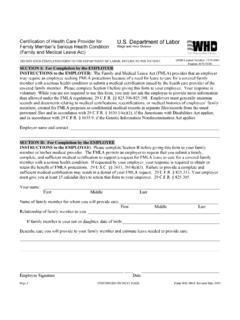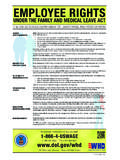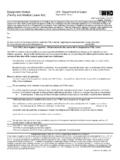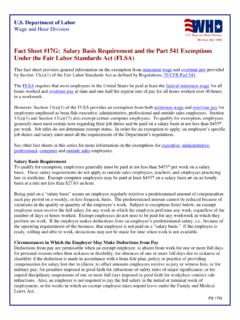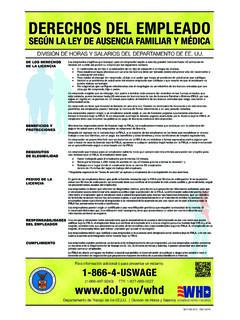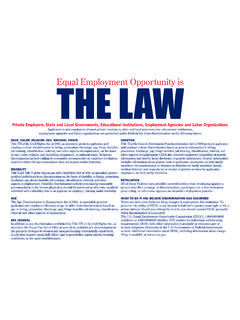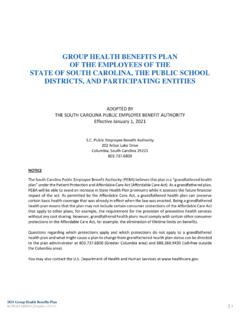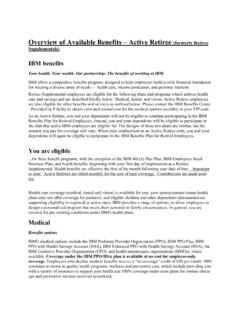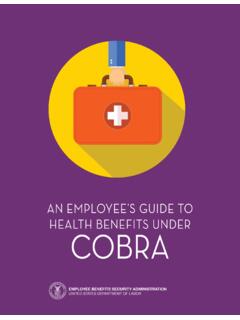Transcription of An Employee’s Guide to Health Benefits Under COBRA - DOL
1 AN employee 'S Guide TO. Health Benefits Under . COBRA . This publication has been developed by the Department of Labor, employee Benefits Security Administration (EBSA). To view this and other publications, visit the agency's Website. To order publications, or to speak with a Benefits advisor, contact EBSA electronically. Or call toll free: 1-866-444-3272. This material will be made available in alternative format to persons with disabilities upon request: Voice phone: (202) 693-8664. TTY: (202) 501-3911. This booklet constitutes a small entity compliance Guide for purposes of the Small Business Regulatory Enforcement Fairness Act of 1996. Contents Introduction ..1. What is COBRA Continuation Coverage? ..2. Who Is Entitled to Continuation Coverage? ..4. COBRA Notice and Election Procedures ..5. Benefits Under Continuation Coverage ..8. Duration of Continuation Coverage ..9. Chart: Summary of Qualifying Events, Qualified Beneficiaries, and Maximum Periods of Continuation Coverage.
2 11. Paying for Continuation Coverage ..12. Coordination with Other Federal Benefit Laws ..13. Role of the Federal Government ..14. Resources ..14. Introduction A Health plan helps workers and their families take care of their essential medical needs. It is one of the most important Benefits an employer can provide. Under the Consolidated Omnibus Budget Reconciliation Act ( COBRA ), many employees and their families who would lose group Health coverage because of serious life events can continue it in the employer's group Health plan for a limited time, usually at their own expense. This booklet explains your rights Under COBRA to a temporary extension of employer-provided group Health coverage, called COBRA continuation coverage. It will: Provide a general explanation of your COBRA rights and responsibilities;. Outline the COBRA rules that group Health plans must follow;. Highlight your rights while you are receiving COBRA continuation coverage. AN employee 'S Guide TO Health Benefits Under COBRA 1.
3 What Is COBRA Continuation Coverage? The Consolidated Omnibus Budget Reconciliation Act ( COBRA ) requires most group Health plans to provide a temporary continuation of group Health coverage that otherwise might be terminated. COBRA requires most group Health plans to offer continuation coverage to covered employees, former employees, spouses, former spouses, and dependent children when group Health coverage would otherwise be lost due to certain events. Those events include: A covered employee 's death, A covered employee 's job loss or reduction in hours for reasons other than gross misconduct, A covered employee 's becoming entitled to Medicare, A covered employee 's divorce or legal separation, and A child's loss of dependent status (and therefore coverage) Under the plan. Employers may require individuals who elect continuation coverage to pay the full cost of the coverage, plus a 2 percent administration charge. The continuation coverage premium is often more expensive than the amount that active employees are required to pay because the employer usually pays part of the cost of active employees' coverage.
4 COBRA continuation coverage lasts only for a limited period of time. COBRA generally applies to all group Health plans maintained by private-sector employers with at least 20 employees or by state and local governments. The law does not apply, however, to plans sponsored by the federal government or by churches and certain church-related organizations. Many states have laws similar to COBRA , including those that apply to Health insurers of employers with fewer than 20 employees (sometimes called mini- COBRA ). Check with your state insurance commissioner's office to see if such coverage is available to you. Under COBRA , a group Health plan is any arrangement that an employer establishes or maintains to provide employees or their families with medical care, whether it is provided through insurance, by a Health maintenance organization, out of the employer's assets, or through any other means. Medical care includes for this purpose: Inpatient and outpatient hospital care, Physician care, Surgery and other major medical Benefits , Prescription drugs, and Dental and vision care.
5 Life insurance and disability Benefits are not considered medical care. COBRA does not cover plans that provide only life insurance or disability Benefits . COBRA -covered group Health plans that are sponsored by private-sector employers generally are governed by the employee Retirement Income Security Act (ERISA). ERISA doesn't require employers to have plans or to provide any particular type or level of Benefits , but it does require plans to follow ERISA's rules. ERISA also gives participants and beneficiaries legally enforceable rights. 2 UNITED STATES DEPARTMENT OF LABOR. Alternatives to COBRA Continuation Coverage If you are entitled to elect COBRA continuation coverage, you should consider all options before you make your decision. There may be more affordable or generous Health coverage options for you and your family through other group Health plan coverage (such as a spouse's plan), the Health Insurance Marketplace, Medicare, Medicaid, or short-term, limited-duration insurance.
6 Under the Health Insurance Portability and Accountability Act (HIPAA), if you or your dependents lose eligibility for group Health coverage, including continuation coverage, you may be able to special enroll in other group Health coverage without waiting until the next open season. For example, an employee who loses group Health coverage may be able to special enroll in a spouse's plan, or a dependent who loses eligibility for group Health coverage may be able to enroll in a different parent's plan. To have a special enrollment opportunity, you or your dependent must have been previously eligible for the plan in which you now want to enroll and had other Health coverage when that plan was first offered to you. You must request special enrollment within 30 days of losing other coverage. Losing your job-based Health coverage also gives you an opportunity to enroll in the Health Insurance Marketplace. The Marketplace allows you to find and compare private Health insurance options.
7 Through the Marketplace, you may qualify for a tax credit that lowers your monthly premiums and cost-sharing reductions to your deductibles, coinsurance, and copayments. Being offered COBRA continuation coverage doesn't limit your eligibility for Marketplace coverage or for a tax credit. You can apply for Marketplace coverage at or by calling 1-800-318- 2596 (TTY 1-855-889-4325). To special enroll in a Marketplace plan, you must select a plan within 60 days before or after losing your job-based coverage. In addition, anyone can enroll in Marketplace coverage during an open enrollment period. If you need Health coverage in the time between losing your job-based coverage and beginning coverage through the Marketplace (for example, if you or a family member needs medical care), you may wish to elect COBRA coverage from your former employer's plan. You then will have Health coverage until the Marketplace coverage begins. Through the Marketplace, you can also learn if you qualify for free or low-cost coverage from Medicaid or the Children's Health Insurance Program (CHIP).
8 You can apply for and enroll in Medicaid and CHIP at any time. If you qualify, your coverage begins immediately. Visit or call 1-800-318-2596 (TTY 1-855-889-4325) for more information or to apply for these programs. You can also apply for Medicaid by contacting your state Medicaid office and learn more about your state's CHIP program by calling 1-877-KIDS NOW (543-7669) or visiting If you or your dependent elects COBRA continuation coverage, you can request special enrollment in another group Health plan or a Marketplace plan if you have a new special enrollment event, such as marriage, the birth of a child, or if you exhaust your COBRA coverage. To exhaust COBRA coverage, you or your dependent must receive the maximum period of COBRA coverage available without early termination. Keep in mind if you choose to terminate your COBRA coverage early with no special enrollment opportunity at that time, you will have to wait until the next open enrollment period to enroll in coverage through another group Health plan or the Marketplace.
9 As an alternative to coverage through the Marketplace, you may also have the option of purchasing short-term, limited-duration insurance. In general, short-term, limited-duration insurance is a type of Health insurance coverage that's primarily designed to fill gaps in coverage that may occur when an individual is transitioning from one coverage to another, such as when a person is in between jobs. This type of insurance may not be suitable coverage for all circumstances. It may not provide coverage that is as comprehensive as individual Health insurance. This type of coverage may be less expensive AN employee 'S Guide TO Health Benefits Under COBRA 3. than traditional insurance and is exempt from federal requirements governing traditional insurance. Because this type of insurance is generally subject to state regulation, coverage and availability will vary by state. Some states have regulations limiting the availability of this type of insurance. There are also states requiring coverage using the Affordable Care Act's essential Health Benefits requirement.
10 If interested in this type of insurance, learn more about your state's regulation at the National Association of Insurance Commissioners' Website. Medicare is the federal Health insurance program for people who are 65 or older and certain younger people with disabilities or End-Stage Renal Disease. Generally, if you lose your job after your Medicare initial enrollment period and did not enroll in Medicare Part A or B, you have an 8-month special enrollment period, beginning the earlier of: The month after your employment ends; or The month after your group Health coverage ends. If you elect COBRA coverage instead of Medicare, you may have to pay a late enrollment penalty and may have a gap in coverage if you later decide you want Part B. If you enroll in Medicare Part A or B. before your COBRA coverage ends, your plan may terminate your continuation coverage. However, if Medicare Part A or B is effective on or before the date you elect COBRA , your plan cannot discontinue your COBRA coverage because of Medicare entitlement even if you enroll in the other part of Medicare after you elect COBRA coverage.
